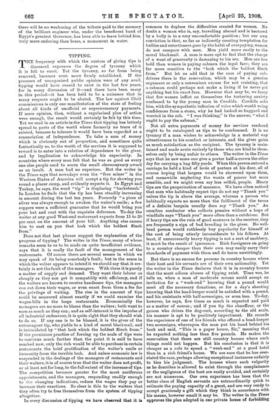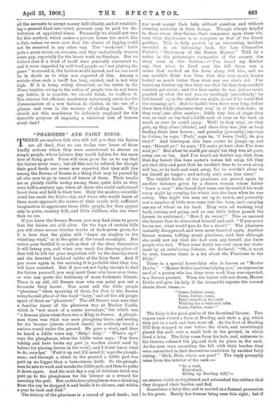TIPPING.
THE frequency with which the custom of giving tips is discussed expresses the degree of tyranny which it is felt to exert. Yet the tyranny, so far from being removed, becomes even more firmly established. If the pressure of unorganised public opinion were of any avail, tipping would have ceased to exist in the last few years, for in every discussion of itāand there have been many in this periodāit has been held to be a nuisance that in many respects ought to be abated. The law against illicit commissions is only one manifestation of the state of feeling about all kinds of unofficial or supernumerary payments. If mere opinion, then, without a regularised plan of action were enough, the result would certainly be felt by this time. Yet we read in an article in the Times that tipping has latterly spread to parts of the world where formerly no trace of it existed, because to tolerate it would have been regarded as a renunciation of independence. To take a sum of money which is obviously out of proportion, and sometimes quite fantastically so, to the worth of the services it is supposed to reward is to enter into a relation of dependence to the giver, and by implication to acknowledge his superiority. In countries where every man felt that he was as good as every one else people used to scorn the small eleemosynary award as an insult. A man bad no superiors. But the writer in the Times says that nowadays even the "free miner" in the Western States of America will accept a tip for showing you round a placer camp, and evidently expects it. In 2gypt and Turkey, he says, the word " tip " is displacing " backsheesh." In London he finds that the tip has been steadily increasing in amount during the last ten years. Formerly "a piece of silver was always enough to awaken the waiter's smile; a few coppers were a sufficient guarantee that he would bring you your bat and coat with the requisite deference. To-day the waiter at any good West-end restaurant expects from 15 to 20 per cent. on the amount of your bill. Anything else causes him to cast on you that look which the boldest flinch horn."
Does not that last phrase suggest the explanation of the progress of tipping? The writer in the Times, many of whose remarks seem to us to be made on quite insufficient evidence, says that it is really the fault of the management of the restaurants. Of course there are several senses in which we may speak of its being somebody's fault ; but in the sense in which the writer appears to intend it we should say that it cer- tainly is not the fault of the managers. With them it is purely a matter of supply and demand. They want their labour as cheaply as they can get it compatibly with efficiency, and if the waiters are known to receive handsome tips, the managers can cut down their wages, or even exact from them a fee for the privilege of waiting. The rise in the amount of tips could be measured almost exactly if we could examine the wages-bills in the large restaurants. Economically the managers are no more to blame than the waiters; both want to earn as much as they can; and as self-interest is the impulse of all industrial endeavour, it is quite right that they should wish to do so. If any one is to be blamed, it is the giver of the extravagant tip, who yields to a kind of moral blackmail, and is intimidated by "that look which the boldest flinch from." If the pernicious practice of forcing up the scale of tips were to continue much further than the point it is said to have reached now, only the rich would be able to purchase in certain restaurants the brief gratification of the waiter's smile or immunity from the terrible look. And unless economic law is suspended in the dealings of the managers of restaurants and their waiters, it is of course true that the waiter does not profit, or at least not for long, to the full extent of the increase of tips. The competition becomes greater for the most auriferous appointments, and the managers, responding readily enough to the changing indications, reduce the wages they pay or increase their exactions. So clear is this to the waiters that they often try to free themselves from the system of tipping altogether.
In every discussion of tipping we have observed that it is common to deplore the difficulties created for women. No doubt a woman Who is, say, travelling abroad and is hectored by a bully is in a very uncomfortable position ; but our own conviction is that, so far as indirectly creating temptation for bullies and extortioners goes by the habit of overpaying, women do not compare with men. Men yield more easily to the moral blackmail. A man is more apt to feel that the charge of a want of generosity is damaging to his sex. Men are less bold than women in paying cabmen the legal fare ; they are far more sensitive to the "look which the boldest flinch from." But let us add that in the case of paying cab- drivers there is the reservation, which may be a genuine argument or only a convenient excuse for not resisting, that a cabman could perhaps not make a living if be never got anything but his exact fare. However that may be, we fancy that few women inflict on themselves the torturing anxiety confessed to by the young man in Candicia. Candida asks him, with the sympathetic inflexion of voice which would wring confidences from a stone, why he had looked so haggard and worried in the cab. "I was thinking," is the answer, "what I ought to pay the cabman."
Not all extra payments of money for services rendered ought to be catalogued as tips to be condemned. It is no tyranny if a man wishes to acknowledge in a material way attentiveness to his comfort or interests, and the giver gains as much satisfaction as the recipient. The tyranny is main- tained and made acute entirely by those who are kind to them. selves only by being unfair to others. The writer in the Times says that he saw some one give a porter half-a-crown the other day for carrying a bag fifty yards. When this person entered a carriage he held a kind of levee of porters at his door, all of course hoping that largess would be showered upon them, and meanwhile neglecting the wants of poorer but more sensible, and we might even say less selfish, people. Heavy tips are the pauperisation of manners. We have often noticed that men who habitually expect tips do not say "Thank you" unless the tip is above the average, whereas a person who habitually expects no more than the fulfilment of the terms of a definite bargain usually does say "Thank you." An omnibus conductor who collects pennies without a hope of windfalls says "Thank you" more often than a cabdriver. But if heavy tips are the ruin of good manners in the receiver, they are frequently a sign of bad breeding in the giver. No well- bred person would ruthlessly buy popularity for himself at the cost of being utterly inconsiderate to his fellows. At least, if unnecessarily heavy tipping is not a sort of snobbery, it must be the result of ignorance. Rich foreigners on going to a country cheaper than their own may easily carry their standards of payment with them and do harm unwittingly.
But there is no excuse for persons in country houses where their host and his servants are of their own nationality. Yet the writer in the Times declares that it is in country houses that the most odious abuses of tipping exist. Time was, he tells us, when a man of moderate means could accept an invitation for a " week-end " knowing that a pound would meet all the necessary donations, or for a day's shooting knowing that the head-keeper would be satisfied with a pound, and his assistants with half-sovereigns, or even less. To-day, however, he says, five times as much is expected and paid as a matter of course ; and if you tip the chauffeur, or the groom who drives the dog-cart, according to the old scale, his manner is apt to be positively impertinent. He records the experience of one of his friends who offered a head-keeper two sovereigns, whereupon the man put his hand behind his back and said, "This is a paper house, Sir," meaning that he expected nothing less than five pounds. He makes the reservation that there are still country houses where such things could not happen. But his conclusion is that it is cheaper as a rule to spend a " week-end " at a good hotel than in a rich friend's house. We are sure that he has over- stated the case, perhaps allowing exceptional instances unfairly to bias his judgment. The houses where such vulgarity as he describes is allowed to exist through the complaisance or the negligence of the host are easily avoided, and certainly are not numerous. Our own experience has been that the better class of English servants are extraordinarily quick to estimate the paying capacity of a guest, and are very ready to accept graciously a gift which they think in accordance with his means, however small it may be. The writer in the Times approves the plan adopted in one private house of forbiddink
all the servants to accept money individually, and of establish- ing a general fund into which, presents may be paid for dis- tribution at appointed times. Personally we should not care for this method, which makes a private house too Much like a club, unless we were sure that the abuses of tipping could not be removed in any other way. The " week-end " habit puts a great strain on servants, and they undoubtedly deserve extra pay, especially for the heavy work on Sundays. But we believe that if a kind of tariff were generally consented to, and it were regarded by well-bred people as "not playing the game" to exceed it, the fashion would spread, and no one need be in doubt as to what was expected of him. Among a certain class such a tariff has long existed, and is not very high. If it is being widely disturbed, as the writer in the Times implies, owing to the action of people who do not know any better, it is possible, we should think, to reaffirm it. The obscure but efficient machinery notoriously exists for the dissemination of a new fashion in clothes, in the use of a phrase, and even in the manner of shaking bands. Why should not this machinery be definitely employed for the ā¢ desirable purpose of imposing a universal rule of honour about tips ?























































 Previous page
Previous page